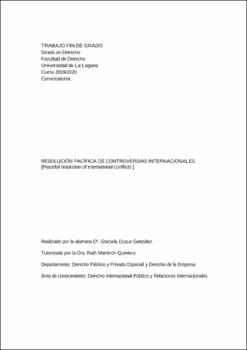Resolución pacífica de controversias internacionales
Author
Duque González, GracielaDate
2020Abstract
Establishing peace in the world is at least a complicated task. If we look
back, or look to the present, we see how our history is marked by wars. The
International Community therefore set out to change the implementation. It
established the obligation on the part of States to resolve disputes by
peaceful means as an alternative to the use of force. Relative obligation,
since access to them depends on the will of the parties. There are seven
means of peaceful settlement, which are divided into non-judicial means
(diplomacy, good offices, mediation, survey or investigation and
conciliation) and judicial means (arbitration and peaceful settlement). The
latter, by basing their solutions on law, are the main object of study and, in
particular, judicial settlement since their activity has a significant impact on
the international order. The creation of various international courts calls
into question whether we are faced with a united and coherent international
legal order or not and whether they are actually creators of law. Establecer la paz en el mundo es una tarea, cuanto menos, complicada. Si
echamos la vista atrás, o miramos al presente, vemos como nuestra historia
está marcada por las guerras. Por consiguiente, la Comunidad Internacional
se propuso cambiar lo implantado. Estableció la obligatoriedad, por parte
de los Estados, de solucionar las controversias por medios pacíficos como
alternativa al uso de la fuerza. Una obligatoriedad relativa, ya que el
acceso a ellos depende de la voluntad de las partes. Son siete los medios de
solución pacífica, que se dividen en medios no jurisdiccionales (la
diplomacia, los buenos oficios, la mediación, la encuesta o investigación y
la conciliación) y medios jurisdiccionales (el arbitraje y el arreglo pacífico).
Estos últimos, por basar sus soluciones en derecho, son el objeto principal
de estudio y, en concreto, el arreglo judicial ya que su actividad tiene un
impacto importante en el orden internacional. La creación de diversos
tribunales internacionales pone en tela de juicio si nos encontramos ante un
ordenamiento jurídico internacional unido y coherente o no y si estos
realmente son creadores de derecho.





